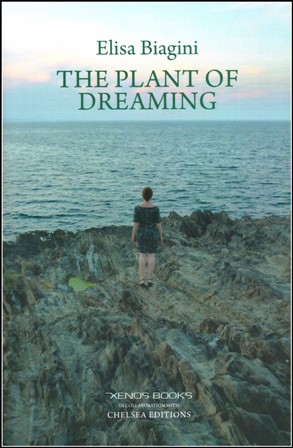Elisa Biagini
The Plant of Dreaming
translated from Italian
by Wallis Wilde-Menozzi,
Eugene Ostashevsky
& Gregory Conti
ISBN 10: 1-879378-96-5
ISBN-13: 978-1-879378-96-4
207 pages, bilingual, $15Cover photo "When it comes, the Landscape listens" (2010) by Dejan Atanackovic.
Frontispiece: Photo of the author by Marco Calvo.
Author Biography | Read Selection
Purchase: Credit card (Amazon.com) | Check or money order
ELISA BIAGINI, born in Florence, has lived, studied and taught in the United States. She earned her Ph.D. at Rutgers University and is currently teaching at New York University-Florence. She has translated Louise Glück, Sharon Olds and other American poets into Italian for the anthology Nuovi Poeti Americani (Einaudi, 2006). Her own poetry, both in Italian and English, has appeared in numerous Italian and American journals, including Raritan and Agni. There are six collections of her poetry in Italy, including L'ospite / The Guest (Einaudi, 2004), Nel Bosco / Into the Wood (Einaudi, 2007) and Nell'osso / Into the Bone (Damocle, 2012). Selections from the first two collections were translated by Diana Thow, Sarah Stickney and Eugene Ostashevsky to form the 2013 Chelsea Editions bilingual publication, The Guest in the Wood, which won the Best Translated Book Award for 2014. Her poetry has been translated into a dozen languages, including French, Spanish, German, Russian, Arabic and Chinese. She collaborates with musicians, artists and choreographers and participates in poetry workshops and festivals in Europe and places as far away as Hong Kong.
Her website: www.elisabiagini.it
"I am not aiming to make things difficult for readers with these texts, but I don't want to console them either. I try to elicit in readers questions regarding their lives, in order to create a space for comparison and reflection."
*******************
"IN A WORLD where they want us ever more separated, where communication is losing all capacity to be dialogue, it is ever more important to choose our words, to be fully conscious of and responsible for our every syllable. And poetry, when it works, or rather when it is not self-satisfied or rhetorical, has just this capacity for measure, fullness of being and critical mirroring of the surrounding reality. It is a necessity, not a luxury for a privileged few, just as a pair of glasses is necessary for things to emerge from the fog and finally speak to us."From the Preface by the author
"Like her previous works, The Plant of Dreaming testifies to an embattled and proudly coherent expressive necessity, determined not to submit to the progressive impoverishment of meaning and experience that today threatens every private destiny. This audacious shrub must thus be given sound and tenacious roots, references to masters felt to be kindred spirits. In the middle section, "The Outing," it is the pilgrim Dante involved in his extraordinary journey to the bowels of the earth; in the first and third sections, the masters are Paul Celan and Emily Dickinson, roommates with whom to share everyday life, borrowing from them the breath needed to melt the icy cold of winter nights and blow away the stale air of hazy afternoons. Their German and English verses are recalled not in order to reproduce their images, imitate their style - Biagini is interested neither in inert quotation nor in post-modern games of allusion, but rather in order to reactivate their meanings and make them explode on the page so as to render them co-present with her own discourse. They are 'fuses to set off a new poetic deflagration.'"From the introduction by Riccardo Donati
Selections from
The Plant of Dreaming
Poetess Elisa Biagini and friend
una pagina è
grande quanto
un sorso,
un
respiro prima
dell'immersione.a page is
large like
a sip
a
breath before
going under.
Quando l'occhio si oscura
non cercare il calore della
mano che la palpebra abbassa,
scappa la melodia della parola,
la voce che ti sorride coi denti rifatti.Se la lingua è mondo, è
specchio, trovatici con la pupilla
spalancata, pescaci da quel nero
quell'inchiostro che dica la parola
verticale. Alla sua ombra crescono
domande, si fa spazio
al respiro del pensare.Non parola orizzontale che sommerge,
ma il bianco dei margini, la pausa che
copre l'assenza tra te e me.When the eye grows dim
don't look for the warmth
of the hand that lowers the eyelid,
escape from the melody of the word,
the voice that smiles at you through false teeth.If language is world, is
mirror, be in it with your pupil
wide open, fish out from that black
the ink that speaks words
vertically. In its shadow questions
grow, space is given
to thoughts breathing.Not horizontal words that submerge,
but the white of margins, the pause that
covers the absence between you and me.
Mi si chiudono
le notti dentro
il palmo,
ti tocco
e sei d'inchiostro.Nights close
inside
my palm,
I touch you
and you are ink.
Catalog |About Us | Links | Order info
